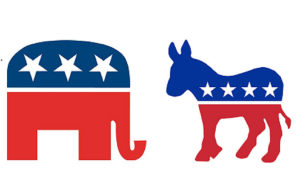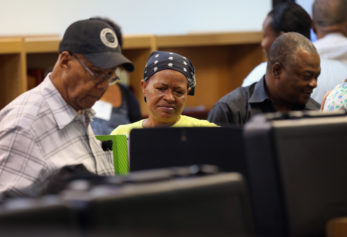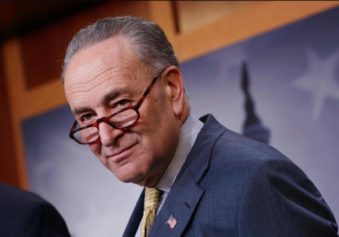In this election season, as the age of Obama comes to end, Black America finds itself at a crossroads. And with the first Black president soon leaving office, the issue of a Black political agenda — or lack thereof — is placed in the spotlight. The questions that arise are whether the two-party system serves the African-American electorate, if Black voters are forced to select between the lesser of two evils, and whether a Black independent political party — or a coalition with other people of color and white progressives – is necessary as a counterweight to donkeys and elephants to ensure that their interests are protected.
At present, Black voters are presented with a Democratic Party that most African-Americans support — even amid decades-long charges that their vote has been taken for granted — and a Republican Party that has emerged as a focal point of white nationalism and is viewed as hostile to Black interests. Meanwhile, within the Democratic Party, Hillary Clinton and Bernie Sanders vie for the Black vote and support of the Black Lives Matter movement, with many Black pragmatists attracted to the former, and idealists attracted to the latter. But are African-American interests being served?
The notion of a Black party is by no means a new concept.
As noted by William A. Darity Jr., Samuel DuBois Cook Professor of Public Policy at Duke University’s Sanford School of Public Policy, an independent Black political party was Malcolm X’s objective at the end of his life.
“I think this is the kind of work that we should have been engaged in a long time ago, well prior to Obama’s election as a Democratic Party candidate. We should not have had high expectations of what his candidacy would be because it was squarely within the two-party system,” Darity told Atlanta Black Star. We should have developed a party for a long time.”
Such efforts were attempted. For example, the preamble of the National Black Political Agenda, also known as the Gary Declaration — an outgrowth of the National Black Political Convention of 1972 — states that “all truly black politics, must begin from this truth: The American system does not work for the masses of our people, and it cannot be made to work without radical fundamental change (indeed, this system does not really work in favor of the humanity of anyone in America).”
In 1980, Black nationalists convened to form the National Black Independent Political Party, out of frustration over the Democratic and Republican Parties.
“The National Black Independent Political Party aims to attain power to radically transform the present socio-economic order. That is, to achieve self-determination and social and political freedom for the masses of Black people. Therefore, our party will actively oppose racism, imperialism, sexual oppression, and capitalist exploitation,” its charter stated.
Darity notes that the successes of past third parties have been tied to the personalities of individual candidates such as Ross Perot or John Anderson.
“Their parties were so associated with them that there was no way to sustain them when their candidacy was done,” he said, adding that a viable third party needs its own base and cannot be dependent on an individual candidate. The professor, who focuses on inequality, believes a third party is necessary in addressing the problems faced by African-Americans. He finds the concept of a party focused on social inequality in America “an exciting prospect.”
“It is essential because the national imagination is deeply constrained by the two-party system. There is no effort to solve the degree of racial inequality, joblessness and poverty, and the existing two-party system will not dramatically change those positions,” Darity said.
“One of the obvious issues is, Blacks are an outvoted minority in this country, unlike South Africa, so there would have to be coalition politics. And those coalitions would have to be carefully crafted so they would be in line with our interests,” he noted.
Darity warned, however, that Black people must be careful about what their interests truly are.
“There is a slippery slope of Black people blaming Black people for our condition. It’s what I call the Bill Cosby point of view — the idea that our problems are a consequence of our actions…which is a complete misanalysis,” he argues. “It’s not sufficient that this is anchored around Black folk. The ideological component of that party is crucial also.”
To advance his argument, Darity pointed to his research on the causes of Black disparity, including the finding that Black people who have college degrees have two-thirds of the net worth of whites who never finished high school. Further, studies have shown that Blacks who have finished some college or have an associate’s degree have a higher unemployment rate than whites who dropped out of high school. These studies are a “powerful indicator” of the problems faced by African-Americans not of their making, Darity insists.
Dr. Randall Miller, a historian and professor at St. Joseph’s University, believes the idea of a Black political party — not necessarily an exclusive party but one that “would push the interests of Black people to the forefront, and would drive policy and practice” geared towards African-American concerns — is a good one.
“One could also make the case that in terms of effectiveness, and in terms of unity of interests coming from the Black community — Black Lives Matter a case in point — doing it within the present party structure, at least in the short run, might be the most effective,” Miller told Atlanta Black Star. “There’s a lot of urgency in these issues. What happens historically with third-parties is they are short-lived, and don’t succeed. If organized well enough, they drive certain issues that force people to address them,” he added. “The extent you can mobilize public interests and support could mean one of the two parties would have to take up the issues.”
To make his point, Miller noted how through external pressure from the Civil Rights Movement, and internal pressure from Fannie Lou Hamer and others, the Democratic Party adopted policies of concern to African-Americans.
“The danger in doing so is it co-opts it and mutes it,” Miller said of movements that align with a particular party. Ultimately, he believes that for third-party politics to succeed, a “radical transformation of white views is needed.”
He thinks, however, that there is also much potential for third-party successes on the local level.
According to Vincent Hutchings, Professor, Department of Political Science at the University of Michigan, the challenge for any third-party effort is that the laws as written by the two parties discourage a third party from emerging.
“Unlike other advanced democracies, the U.S. makes it difficult to form a third party,” Hutchings told Atlanta Black Star, noting the winner-take-all system in which a party wins with a majority of the votes and not a plurality.
“The people who are there want to keep it that way,” he said.
Ultimately, because the rules do not favor a third party, “the third party would ultimately have to replace one of the two parties in order for that to happen,” Hutchings added.
Although the prospects are difficult, however, he believes such efforts as a Black independent party should be encouraged.
“A case is to be made for a party outside the Democratic or Republican Party. Just as the system is rigged to prevent the rise of a third party, the system is set up as to not be responsive to the interests of African-Americans,” he noted. “It’s set up in part because of the nature of the electorate. Most of the voters are white, and given the peculiar history of this country, they are not inclined to embrace the sorts of policies that would be necessary to address longstanding racial inequities,” Hutchings said.
Given that the system will make no substantial efforts to address these intractable forms of inequality, Hutchings said, it makes perfect sense to consider political structures outside the traditional two-party system.
“The issues that African-Americans and others face in this country can be described succinctly: For multiple generations, the United States has afforded privileges to people classified as whites. We are not only living with the residue of that, but the process is going on in 2016. The issue is not one about Black disadvantage and inequality, but white advantage and inequality that is sanctioned by the state,” he noted, emphasizing the need to address white supremacy and the privileges afforded to white folks.
“That portion of the population, on balance, will be reluctant to give up that power as a rule. Whites are reluctant to recognize they possess disproportionate advantage and give up anything that would diminish that advantage, and that is whether whites belong to the Republican or Democratic parties,” Hutchings said.
Further, he believes that addressing the concerns of Black people “means taking something away from whites,” which none of the presidential candidates are inclined to do, because “it is not in their political fortunes to do so.”
In addition, the political science scholar views a Black coalition with other groups “as being desirable, though not realistic in the short term.” However, he also noted that “at one time it was unrealistic to consider abolishing slavery or giving women the right to vote. History is peppered with things that were once unrealistic.”
Moreover, there are inherent difficulties to establishing an independent Black party, which would require a great deal of grassroots organizing, funding and internal unity. As Frederick Douglass once said, “If there is no struggle there is no progress. Power concedes nothing without a demand. It never did and it never will.”
For example, as Hurumia Ahati wrote in “An Independent Black Political Party: Posing an Alternative to Asses, Elephants and Rainbows” in the National Black Law Journal in 1988, the party may be labeled as separatist and not desirable for some Black people over being involved in a white-dominated power structure.
Hutchings anticipates some internal barriers to the success of such an organization. “
Other Black people will be resistant,” he contends. “Given the depressed disadvantage of many African-Americans, you understand why they cling their allegiance to the Democratic Party, because the other party wants to make things even worse. So a solution outside the two-party system has some risks. The risk is that the current allegiance to the current Democratic Party might facilitate the success of the Republican Party,” he noted.
“We also risk sticking to the current strategy. Things are bad, the Democrats are not going to make them better, and the Republicans will make them worse. So, pick your poison.”



